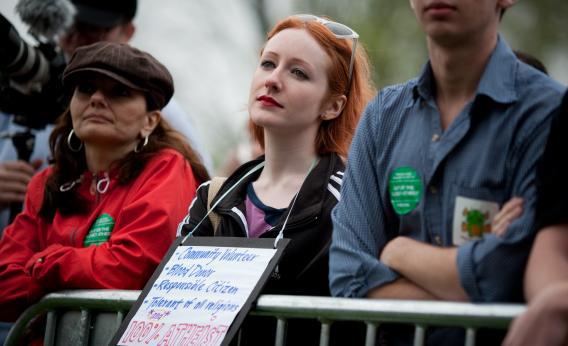Why are women so dramatically under-represented in the growing atheist/secularist movement? That’s a question tackled by Susan Jacoby in this month’s edition of The Humanist in an article that features Jacoby’s strengths of strong historical analysis, calm self-assurance in the face of dithering sexist responses, and a sincere belief that change is possible. Jacoby argues that secularism really should embrace feminism, especially considering that feminism (and I’ll add, gay rights, which is intertwined with feminism) is the most secular social justice movement in history. Maintaining male dominance has been one of the primary functions of religion throughout history, so feminism by and large has been a movement without much of a religious component, and often a movement that aggressively rejects religion.
So why then are most atheist activists male and why then do events highlighting the specific ways that religion abuses women draw so little interest from male atheists and humanists? By far straight women and LGBT folks are the targets of the most serious human rights violations that occur on a regular basis because of religious fundamentalists using government to foist their dogma on the rest of us. Having your kid hear that Jesus rode a dinosaur is a serious violation of your First Amendment rights, of course, but having your insurance benefits you’ve paid for taken away or having your access to abortion cut off because of someone else’s kooky religious beliefs is much worse. But Jacoby reports a tendency amongst some male secularists to treat these concerns as beneath their attention. It’s not hard to see why women might not care to join a movement dedicated to fighting religious influence over politics that marginalizes some of the most serious examples of it because the victims made the mistake of being women.
Jacoby doesn’t mention it, but the problem has grown beyond the casual sexism behind marginalizing women’s issues or even male atheists ignorantly deploying negative stereotypes about women in their arguments. As more women have joined with the movement, more voices have been making these connections between feminism and secularism, which awakened a previously unknown contingent of angry misogynist atheists. Atheist activists who make overtly feminist arguments have been targeted by vicious harassment campaigns, often for no other reason than trying to reduce the amount of sexual harassment women encounter at conventions. One blogger who started a forum for atheists who want to focus more on social justice than trying to get “under God” out of the Pledge received so much abuse that she quit blogging. While most secularists are agreeable to incorporating feminist worldviews into the agenda, the few who oppose feminism have been so dogged that female atheists can’t be faulted if they decide to put their time and attention elsewhere. Casual sexists can be persuaded to take a more female-inclusive approach through education, but unfortunately, education doesn’t work on dogged misogynists. As long as the harassment and abuse of atheists who speak out about feminism continues, the low numbers of female participation in secularist events will also continue.
